We hope you have some down time to spend time with family, relax, and perhaps pick up your next great read this holiday season. Here’s our quarterly list of books on our radar. We are proud that one of the books on our list is our latest free ebook: “The Response: Building Collective Resilience in the Wake of Disasters.” Take a look and let us know your thoughts.
As always, these books are either new, or new to us and if you notice anything we’ve missed, let us know at info@shareable.net. Happy reading!
Below are summaries, excerpted from each book’s website:
 Prosocial: Using Evolutionary Science to Build Productive, Equitable, and Collaborative Groups by Paul W.B. Atkins, David Sloan Wilson and Steven C. Hayes
Prosocial: Using Evolutionary Science to Build Productive, Equitable, and Collaborative Groups by Paul W.B. Atkins, David Sloan Wilson and Steven C. Hayes
Whether you work in business or schools, volunteer in neighborhoods or church organizations, or are involved in social justice and activism, you understand the enormous power of groups to enact powerful and lasting change in the world. But how exactly do you design, build, and sustain effective groups?
Based on the work of Nobel Prize winning economist Elinor Ostrom and grounded in contextual behavioral science, evolutionary science, and acceptance and commitment therapy, Prosocial presents a practical, step-by-step approach to help you energize and strengthen your business or organization. Using the Prosocial model, you’ll learn to design groups that are more harmonious, have better member or employee retention, have better relationships with other groups or business partners, and have more success and longevity. Most importantly, you’ll learn to target the characteristics that foster cooperation and collaboration—key ingredients for any effective group.
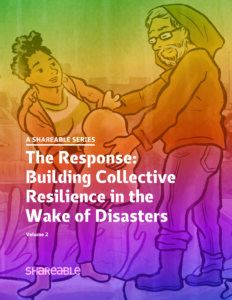 The Response: Building Collective Resilience in the Wake of Disasters by Shareable
The Response: Building Collective Resilience in the Wake of Disasters by Shareable
When disasters occur, the majority of news coverage teeters on the edge of “disaster porn” at best, emphasizing the sheer mass of destruction in the affected area while celebrating a few token “heroes.” News reporting routinely underplays how local communities come together to recover from the immediate devastation and collectively rebuild the community, often on a new foundation of sustainability and justice. It’s a good thing that people collaborate instead of competing during a crisis because all signs point towards an increase in climate change-fueled disasters in the coming years.
This collection of interviews, articles, guides, and personal stories is designed to deepen the understanding of community led disaster response and support deeper engagement between neighbors, family, and friends In preparation for a future together.
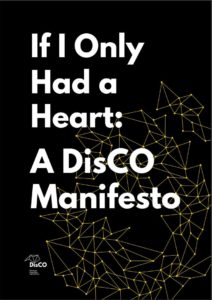 If I Only had a Heart: a DisCO Manifesto
If I Only had a Heart: a DisCO Manifesto
The DisCO Manifesto is a deep dive into the world of Distributed Cooperative Organizations. Over its 80 colorful pages, you will read about how DisCOs are a P2P/Commons, cooperative and Feminist Economic alternative to Decentralized Autonomous Organizations. The DisCO Manifesto also includes some background on topics like blockchain, AI, the commons, feminism, cooperatives, cyberpunk, and more.
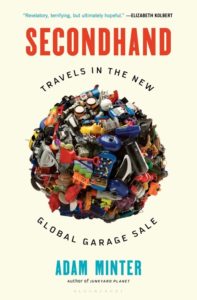 Secondhand: Travels in the New Global Garage Sale by Adam Minter
Secondhand: Travels in the New Global Garage Sale by Adam Minter
Downsizing. Decluttering. A parent’s death. Sooner or later, all of us are faced with things we no longer need or want. But when we drop our old clothes and other items off at a local donation center, where do they go? Sometimes across the country-or even halfway across the world-to people and places who find value in what we leave behind.
In Secondhand, journalist Adam Minter takes us on an unexpected adventure into the often-hidden, multibillion-dollar industry of reuse: thrift stores in the American Southwest to vintage shops in Tokyo, flea markets in Southeast Asia to used-goods enterprises in Ghana, and more. Along the way, Minter meets the fascinating people who handle-and profit from-our rising tide of discarded stuff, and asks a pressing question: In a world that craves shiny and new, is there room for it all?
 The intersection of politics and spirituality in addressing the climate crisis by Mohammed Sofiane Mesbahi
The intersection of politics and spirituality in addressing the climate crisis by Mohammed Sofiane Mesbahi
We are in the midst of a planetary emergency. Radical and urgent changes are needed to avert catastrophe, but still we are failing to act in accordance with the science. So what is preventing us from rapidly transitioning to clean energy and adopting more equitable, simpler ways of living?
This extended dialogue with Mohammed Sofiane Mesbahi provides an inspiring answer to the most important question of our time. What begins as a broad discussion of the UN climate change negotiations unfolds into a profound exploration of the spiritual aspects of the climate crisis—a crisis that stems from our lack of loving awareness and right human relations. With candour and profound insight, Mesbahi sets out his vision of a mass engagement of the public, united by their demand for sharing the world’s resources.
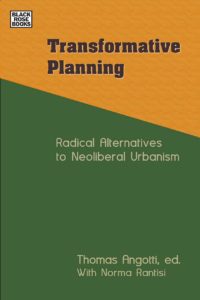 Transformative Planning: Radical Alternatives to Neoliberal Urbanism by Tom Angotti
Transformative Planning: Radical Alternatives to Neoliberal Urbanism by Tom Angotti
Though modern urban planning is only a century old, it appears to be facing extinction. Historically, urban planning has been narrowly conceived, ignoring gaping inequalities of race, class, and gender while promoting unbridled growth and environmental injustices. In Transformative Planning, Tom Angotti argues that unless planning is radically transformed and develops serious alternatives to neoliberal urbanism and disaster capitalism it will be irrelevant in this century. This book emerges from decades of urban planners and activists contesting inequalities of class, race, and gender in cities around the world. It compiles the discussions and debates that appeared in the publications of Planners Network, a North American urban planners’ association. Original contributions have been added to the collection so that it serves as both a reflection of past theory and practice and a challenge for a new generation of activists and planners.
 Villages in Cities: Community Land Ownership, Cooperative Housing, and the Milton Parc Story edited by Josh Hawley and Dimitrios Roussopoulos
Villages in Cities: Community Land Ownership, Cooperative Housing, and the Milton Parc Story edited by Josh Hawley and Dimitrios Roussopoulos
As gentrification threatens to uproot neighbourhoods across the world, the flame of co-operative housing has been reignited. Meanwhile, community land ownership has the potential to turn the tide and put the destiny of our cities into the hands of residents. Villages in Cities takes us across North America to Montreal, Boston, Vermont, and Mississippi, presenting concrete examples of citizens taking back the land and claiming their right to secure housing. It also acts as a guidebook to contemporary urban struggles through fertile archival material from the Milton Parc struggle, which is as relevant today as it was 50 years ago. Villages in Cities presents a succinct portrait of the problems facing the ownership of urban land and concrete strategies for communities to take back urban land from the market and the State.
 A Planet to Win: Why We Need a Green New Deal by Kate Aronoff, Alyssa Battistoni, Daniel Aldana Cohen, and Thea Riofrancos
A Planet to Win: Why We Need a Green New Deal by Kate Aronoff, Alyssa Battistoni, Daniel Aldana Cohen, and Thea Riofrancos
The age of climate gradualism is over, as unprecedented disasters are exacerbated by inequalities of race and class. We need profound, radical change. A Green New Deal can tackle the climate emergency and rampant inequality at the same time. Cutting carbon emissions while winning immediate gains for the many is the only way to build a movement strong enough to defeat big oil, big business, and the super-rich—starting right now.
A Planet to Win explores the political potential and concrete first steps of a Green New Deal. It calls for dismantling the fossil fuel industry, building beautiful landscapes of renewable energy, and guaranteeing climate-friendly work, no-carbon housing, and free public transit. And it shows how a Green New Deal in the United States can strengthen climate justice movements worldwide. We don’t make politics under conditions of our own choosing, and no one would choose this crisis. But crises also present opportunities. We stand on the brink of disaster—but also at the cusp of wondrous, transformative change.
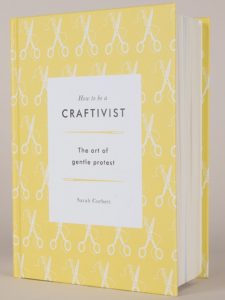 How To Be A Craftivist: The Art of Gentle Protest by Sarah Corbett
How To Be A Craftivist: The Art of Gentle Protest by Sarah Corbett
In today’s world it’s easy to feel helpless, but here is a book to initiate debates rather than shouting matches, to enable collaboration in place of confrontation. Gentleness can be a great strength, and quiet action can sometimes speak as powerfully amid the noise as the loudest voice. And if we want a world that is beautiful, kind and fair… shouldn’t our activism be beautiful, kind and fair?
Interwoven with my personal stories of causes addresses are ideas and suggestions for every novice craftivist. From how to think about the medium itself, to looking at colour, fonts, size and message, here is inspiration for every detail of your creation.
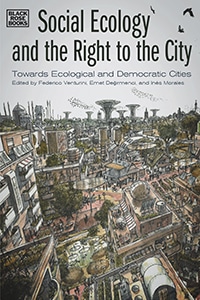 Social Ecology and the Right to the City: Towards Ecological and Democratic Cities edited by Federico Venturini, Emet Degirmenci, and Ines Morales
Social Ecology and the Right to the City: Towards Ecological and Democratic Cities edited by Federico Venturini, Emet Degirmenci, and Ines Morales
Cities today are increasingly at the forefront of the environmental and social crisis—they are simultaneously a major cause and a potential solution. Across the world, a new wave of urban social movements is rising to fight against corporate control, social exclusion, hostile immigration policies, gender oppression, and ecological devastation. These movements are building economic, social, and political alternatives based on solidarity, equality, and participation. This anthology develops the debates that began at the recent Transnational Institute of Social Ecology’s (TRISE) conference about the dire need to rebuild the social and political realities of our world’s cities. It discusses the prospects of radical urban movements; examines the revolutionary potential of the concept of “the Right to the City,” and looks at how activists, scholars, and community movements can work together towards an ecological and democratic future. A fruitful conversation between theory and practice, this book opens new ground for rethinking systemic urban change in a way that challenges oppression and transforms how people work, create, and live together.









